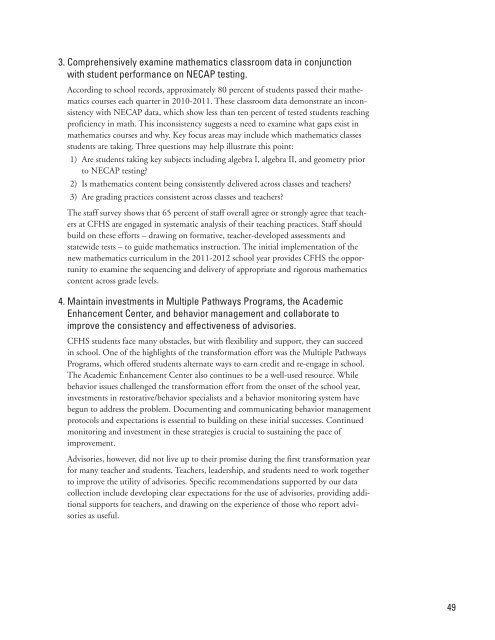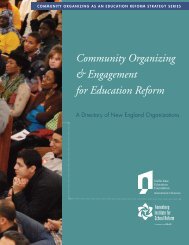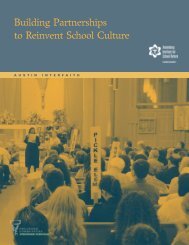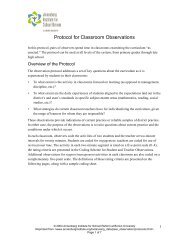Central Falls Transformation Report - Annenberg Institute for School ...
Central Falls Transformation Report - Annenberg Institute for School ...
Central Falls Transformation Report - Annenberg Institute for School ...
Create successful ePaper yourself
Turn your PDF publications into a flip-book with our unique Google optimized e-Paper software.
3. Comprehensively examine mathematics classroom data in conjunction<br />
with student per<strong>for</strong>mance on NECAP testing.<br />
According to school records, approximately 80 percent of students passed their mathematics<br />
courses each quarter in 2010-2011. These classroom data demonstrate an inconsistency<br />
with NECAP data, which show less than ten percent of tested students reaching<br />
proficiency in math. This inconsistency suggests a need to examine what gaps exist in<br />
mathematics courses and why. Key focus areas may include which mathematics classes<br />
students are taking. Three questions may help illustrate this point:<br />
1) Are students taking key subjects including algebra I, algebra II, and geometry prior<br />
to NECAP testing?<br />
2) Is mathematics content being consistently delivered across classes and teachers?<br />
3) Are grading practices consistent across classes and teachers?<br />
The staff survey shows that 65 percent of staff overall agree or strongly agree that teachers<br />
at CFHS are engaged in systematic analysis of their teaching practices. Staff should<br />
build on these ef<strong>for</strong>ts – drawing on <strong>for</strong>mative, teacher-developed assessments and<br />
statewide tests – to guide mathematics instruction. The initial implementation of the<br />
new mathematics curriculum in the 2011-2012 school year provides CFHS the opportunity<br />
to examine the sequencing and delivery of appropriate and rigorous mathematics<br />
content across grade levels.<br />
4. Maintain investments in Multiple Pathways Programs, the Academic<br />
Enhancement Center, and behavior management and collaborate to<br />
improve the consistency and effectiveness of advisories.<br />
CFHS students face many obstacles, but with flexibility and support, they can succeed<br />
in school. One of the highlights of the trans<strong>for</strong>mation ef<strong>for</strong>t was the Multiple Pathways<br />
Programs, which offered students alternate ways to earn credit and re-engage in school.<br />
The Academic Enhancement Center also continues to be a well-used resource. While<br />
behavior issues challenged the trans<strong>for</strong>mation ef<strong>for</strong>t from the onset of the school year,<br />
investments in restorative/behavior specialists and a behavior monitoring system have<br />
begun to address the problem. Documenting and communicating behavior management<br />
protocols and expectations is essential to building on these initial successes. Continued<br />
monitoring and investment in these strategies is crucial to sustaining the pace of<br />
improvement.<br />
Advisories, however, did not live up to their promise during the first trans<strong>for</strong>mation year<br />
<strong>for</strong> many teacher and students. Teachers, leadership, and students need to work together<br />
to improve the utility of advisories. Specific recommendations supported by our data<br />
collection include developing clear expectations <strong>for</strong> the use of advisories, providing additional<br />
supports <strong>for</strong> teachers, and drawing on the experience of those who report advisories<br />
as useful.<br />
49













